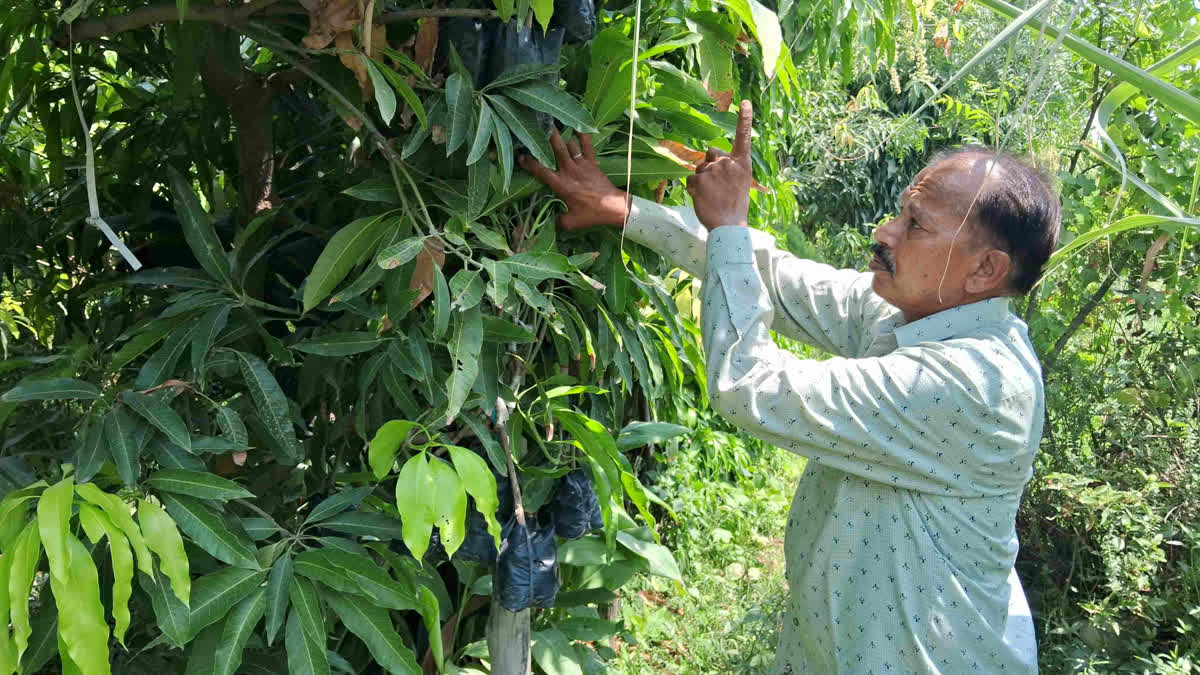Kota (Rajasthan): Farmer Shrikishan Suman, a resident of Girdharpur village in Ladpur tehsil of the Kota district, has made headlines because of his unique mango tree. The mango trees he has planted in the Mughal Garden of the Rashtrapati Bhavan are already bearing fruits.
He has been honoured twice by different Presidents for innovating the evergreen mango variety. Apart from this, many Chief Ministers and Agriculture Ministers, the National Innovation Foundation and many other organisations have lauded him.
The speciality of his mango tree is such that it is in demand not only in India but also across the globe because the mango trees he developed bear mangoes throughout the year.
Many foreigners visit India just to bring back these mangoes to their countries. Now Shrikishan is also getting a patent done for this variety, for which registration has already been done.
Shrikishan says that he started cultivating mangoes in 1998 and began to think of innovative ideas to make mangoes available throughout the year.
He found success between 2014 to 2015. The trees he developed yielded mangoes three times a year, whereas the normal trees yielded mangoes only once. He then started selling mangoes even in the off-season from 2016 onwards. At present, mangos are being sold in bulk at Rs 40 to Rs 60 per kg.
Shrikishan receives Rs 10 to 15 more per kg for his mangoes. Suman says that in the off-season the price of this mango goes up to Rs 200 per kg.
According to Shrikishan, the news of his innovation even reached scientists all over the country. After 2018, he has grown and sold about 25,000 saplings.
He has sold his saplings in many states and Union Territories including Kerala, Karnataka, Andhra Pradesh, Tamil Nadu, Gujarat, Maharashtra, Uttar Pradesh, Madhya Pradesh, Delhi, Haryana, Punjab and Chandigarh. This variety has been taken by scientists and farmers even outside India in countries like the US, Germany, United Arab Emirates, Canada, Iraq, Iran and many African countries.
Shrikishan says that the fruit and flowering continue on the evergreen variety of plants. All types of mangoes, big and small, grow on the tree. Along with ripe mangoes, small mangoes and flowering fruits also grow on the tree. This cycle runs throughout the year. The specialty of mango is that after ripening it weighs between 250 to 350 grams.
Apart from this, the fruits do not fall from the trees even during storms they have to be plucked when they are ripe. The seeds of evergreen mango are small and the saffron colour of the fruit comes out from within and ripens on the tree itself and tastes like Alphonso mango.
Shrikishan says that there was an order for one lakh plants from Africa, but the plants could only be sent out after testing the Indian soil, for which many types of tests are required in the laboratory. It was not possible to get so many tests done which caused him to cancel the order.
He says that during the division of the family land, he got one 'bigha' of ancestral land in Girdharpura. He had planted 1,000 saplings on this land itself and from that earning, he bought a three-bigha farm in Delunda, where he planted 1,500 saplings. Currently, these plants have started bearing fruits only at the age of five years although the production is still low.
From the plants of the new garden, 50 to 60 kg of mangos are obtained annually, while from the old plants, around 150 to 180 kg are obtained. Recently he has signed a contract with a company, under which 20,000 saplings are to be planted in Lakheri. There will be completely organic farming there.
The NIF has awarded Shrikisan for the modified variety of evergreen mangoes. This award was given to him by then President Pranab Mukherjee in 2017, after which President Draupadi Murmu also honoured him in 2023. The Indian Council of Agricultural Research (ICAR) and other institutions working in agricultural research have also honoured him.
Shrikisan was pursuing his B.Sc. but the family circumstances were not good, so he had to leave his studies midway and take up agriculture. He was the eldest in the family and they had only seven bighas of land to farm on.
As it was difficult to take care of the family, he began vegetable farming for a better daily income. It worked for him and started selling vegetables, but due to the harm caused to people by the pesticides, they abandoned the idea.
He planted roses of different colours on the same stem using the grafting technique. He started further research by planting mango saplings and trying different combinations on his grafts.
When flowering took place even in the winter season, on that mango plant, agricultural scientists and people of the agriculture department were astonished. Later, using this technique, he planted many more plants, from which mangoes started growing throughout the year. His mango sapling was also exhibited in Rashtrapati Bhavan and the then President Pranab Mukherjee also got four such saplings planted in the well-known Mughal Garden.
The innovative mango variety is resistant to most major diseases and common mango disorders


